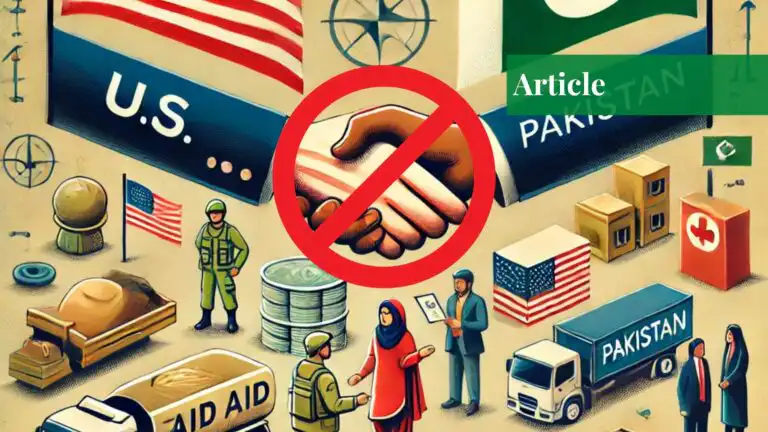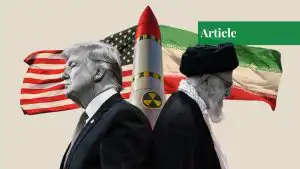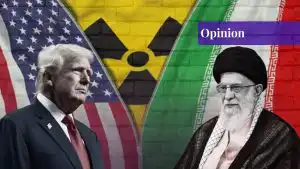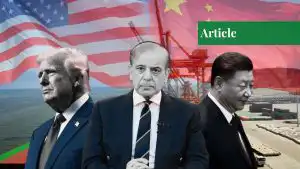Introduction
Pakistan and America have been strategic allies since the birth of the Pakistani nation in 1947. As claimed by the US embassy and consulates in Pakistan, over the past 20 years, America has given more than $32 billion as direct aid to Pakistan. America has been aiding many projects in Pakistan, some of which are governance projects, projects related to inclusivity and equality, and some related to promoting democracy. One of the most notable is the military aid given to Pakistan by the USA.
Starting in 2002, in the US-led war in Afghanistan, Pakistan was one of the non-NATO allies of America, and the USA gave more than $2 billion to Pakistan in military aid, which also included $1.2 billion in coalition support funds. After the events of 2002-2011, Pakistan became the largest recipient of aid from America; a large portion of this was military aid.
The decline in military aid to Pakistan started in the year 2011 when Osama Bin Laden was found and killed in Abbottabad, Pakistan, after which US officials were scrutinized by the public and asked to justify their strategy behind aiding Pakistan. This resulted in the Obama administration announcing to withhold $800 million in military aid to Pakistan in the year 2011.
Military Aid Reduction in 2018
In 2018, America, under the Trump administration, announced to give conditional aid to Pakistan amounting to $225 million, which was only to be accessed if Pakistan took more actions against the terrorist militant groups. The aid was later halted by America the same year when it announced a $300 million cut in military aid to Pakistan. The US gave ambiguous reasons, like saying that Pakistan has not done enough to combat the terrorism problem in Afghanistan and on its own soil. Pakistan strongly refuted this claim at the time, as it was felt that the efforts and sacrifices of the Pakistani military and general population were undermined by the US. The US needed a scapegoat, and Pakistan was the perfect fit for the situation.
Recent Sanctions on Pakistan’s Ballistic Missile Program
In April of 2023, the US placed sanctions on one company from Belarus and 3 from China for allegedly assisting Pakistan in its ballistic missile program. Later in October of the same year, sanctions were placed against three Chinese companies for the same claim. These two events, however, failed to deter Pakistan from working on its defense mechanism, which, according to the experts in Pakistan, might have offended the USA and put Pakistan on the radar.
This analysis was proved correct when, on 19th December 2024, America imposed sanctions on four Pakistani companies with the same claim that they were assisting with the state’s ballistic missile program. Pakistan, however, is of the view that these sanctions have not been successful in hindering the missile program in the past, and these recent sanctions will not have any effect either.
Executive Stop-work Order on US Foreign Aid
In the very first week of President Trump taking the oath of office, an executive order was passed. On January 26, 2025, the Trump administration passed a stop-work order on all foreign aid programs, including civil and military programs. The executive order announced the suspension of all aid for 90 days, during which it will be “reevaluating and realigning” the US foreign aid.
The US, for the longest time, has been the biggest aid provider, reportedly spending $68 billion in the year 2023. The executive order is a blanket order that has stopped all aid, be it for development or military aid for 90 days, till 21st April 2025. The continuation of the aid will be decided based on the foreign policies of countries across the world and how they benefit America.
Domestic Effects and Legality of the Executive Order
Initially, the executive order also halted aid on the domestic level, which is three times more than that of the international level. This, however, was strongly protested by the affected community nationwide, and consequently, it was resumed by a federal court. An important detail to note here is that in America, only Congress is responsible for allocating and freezing funds. The president, under US law, has no authority to allow or halt any funds or aid by way of executive order. This has led to a wave of protests against the passing of this order. This protest is mainly led by the Democrats.
Chuck Schumer, a minority leader of the United States Senate and a member of the Democratic Party, in response to the executive order, reportedly stated that the president does not have the authority to go beyond the law. Other members of the party have termed the order “presidential overreach,” which shows the order was condemned at the domestic level as well.
Exceptions to the Order
The order has a few exceptions when it comes to military funding. These exempted countries include Israel and Egypt, which has raised questions from analysts on why Ukraine, Gaza, and Afghanistan were not exempted from the order, as these are the countries that are bound to suffer the most at the hands of this order.
The US Halting Military Aid to Pakistan
The order halts military aid as well as civilian aid. Pakistan, since 2001, has been one of the largest recipients of military aid from the USA. Which has been fluctuating since 2011. The passing of this order, however, has completely paused all military aid, which according to many, might be resumed after 90 days or may be shelved completely. Zeeshan Salahuddin, Director of the Centre for Global and Regional Connectivity, reportedly said in an interview that the USAID funding has been halted worldwide and Pakistan is naturally a part of it. But, according to him, aid from America to Pakistan has been decreasing for many years now; therefore, the effect of this order might not be as severe as it would have been a decade ago.
Assistance Follows US interest
Over the past decade, the USA has periodically stopped military aid to Pakistan citing somewhat ambiguous reasons, and systematically reduced aid with the reduction in America’s interest in Pakistan. According to many experts, the US has always had a pattern that shows it does not blindly aid or fund anyone without having its own concealed interest.
After the First World War, from 1946-1952, the US gave $29.3 billion in aid to Germany and $15.2 billion to Japan. Both countries are one of the biggest allies of America today. Later, in 2023, it gave military aid to Ukraine and Israel. All these countries serve the interests of the US in one way or another. This is also evident from John Kerry’s statement that he gave in 2013, where he stated, “Let me be very clear: Foreign assistance is not a giveaway. It’s not charity. It is an investment in a strong America and a free world.”
Conclusion
Pakistan and America had an unspoken drift after the incidents of 2011, and the final hit was the withdrawal of the US from Afghanistan in 2021, after which the two nations failed to find a mutual interest in cooperation, and consequently, America no longer had an interest in providing Pakistan with military aid. In fact, it now considers Pakistan a potential threat due to its increased alliance with China. Pakistani officials and civil society are confident that this blockage of aid from the US will not have dire effects on Pakistan or its military. Experts have also called it a blessing in disguise, as they believe this will give Pakistan a chance to focus more on domestic resources and will be a step towards a self-sufficient Pakistan.
If you want to submit your articles and/or research papers, please check the Submissions page.
The views and opinions expressed in this article/paper are the author’s own and do not necessarily reflect the editorial position of Paradigm Shift.
Fatima Mazhar is a 9th-semester law student at the International Islamic University, Islamabad. She is currently serving as the chairperson of the Law Students Council, Pakistan.






